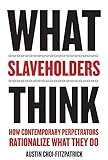What Slaveholders Think : How Contemporary Perpetrators Rationalize What They Do / Austin Choi-Fitzpatrick.
Material type: TextPublisher: New York, NY : Columbia University Press, [2017]Copyright date: ©2017Description: 1 online resource (248 p.)Content type:
TextPublisher: New York, NY : Columbia University Press, [2017]Copyright date: ©2017Description: 1 online resource (248 p.)Content type: - 9780231181822
- 9780231543828
- 306.3/620905 23
- HT867 .C46 2017
- HT867 .C46 2017
- online - DeGruyter
- Issued also in print.
| Item type | Current library | Call number | URL | Status | Notes | Barcode | |
|---|---|---|---|---|---|---|---|
 eBook
eBook
|
Biblioteca "Angelicum" Pont. Univ. S.Tommaso d'Aquino Nuvola online | online - DeGruyter (Browse shelf(Opens below)) | Online access | Not for loan (Accesso limitato) | Accesso per gli utenti autorizzati / Access for authorized users | (dgr)9780231543828 |
Frontmatter -- Contents -- Acknowledgments -- 1. In All Its Forms: Slavery and Abolition, Movements and Targets -- 2. Best-Laid Plans: A Partial Theory of Social Movement Targets -- 3. Just Like Family: Slaveholders on Slavery -- 4. As If We Are Equal: Slaveholders on Emancipation -- 5. The Farmer in the Middle: Target Response to Threats -- 6. Private Wrongs: Slavery and Antislavery in Contemporary India -- 7. Long Goodbye: The Contemporary Antislavery Movement -- 8. Between Good and Evil: The Everyday Ethics of Resources and Reappraisal -- Notes -- References -- Index
restricted access online access with authorization star
http://purl.org/coar/access_right/c_16ec
Drawing on fifteen years of work in the antislavery movement, Austin Choi-Fitzpatrick examines the systematic oppression of men, women, and children in rural India and asks: How do contemporary slaveholders rationalize the subjugation of other human beings, and how do they respond when their power is threatened? More than a billion dollars have been spent on antislavery efforts, yet the practice persists. Why? Unpacking what slaveholders think about emancipation is critical for scholars and policy makers who want to understand the broader context, especially as seen by the powerful. Insight into those moments when the powerful either double down or back off provides a sobering counterbalance to scholarship on popular struggle. Through frank and unprecedented conversations with slaveholders, Choi-Fitzpatrick reveals the condescending and paternalistic thought processes that blind them. While they understand they are exploiting workers' vulnerabilities, slaveholders also feel they are doing workers a favor, often taking pride in this relationship. And when the victims share this perspective, their emancipation is harder to secure, driving some in the antislavery movement to ask why slaves fear freedom. The answer, Choi-Fitzpatrick convincingly argues, lies in the power relationship. Whether slaveholders recoil at their past behavior or plot a return to power, Choi-Fitzpatrick zeroes in on the relational dynamics of their self-assessment, unpacking what happens next. Incorporating the experiences of such pivotal actors into antislavery research is an immensely important step toward crafting effective antislavery policies and intervention. It also contributes to scholarship on social change, social movements, and the realization of human rights.
Issued also in print.
Mode of access: Internet via World Wide Web.
In English.
Description based on online resource; title from PDF title page (publisher's Web site, viewed 02. Mrz 2022)


